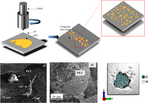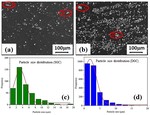Friction stir welding
Friction stir welding (FSW) is a solid-state joining process used to join two similar and dissimilar materials below the liquidus temperature of the material. It is a recently developed technique by The Welding Institute (TWI) in 1991. The advantages of FSW over conventional welding techniques had led to its advancements in almost all the industrial sectors. The increasing demand for the high strength to weight ratio components has led to various materials in industries such as polymers, ceramics, metals, composites, etc. The efficient and reliable joining of these classes of materials is another challenging task that FSW can accomplish. Our research work in this domain has advanced beyond the joining of Aluminium alloys. Some of the successful studies include:
FSW of Additively Manufactured Titanium Alloy (Ti6Al4V) The FSW feasibility study was performed on the Ti6AL4V alloy manufactured through the electron beam melting process. The characterisation techniques performed during this work included optical microscopy, SEM, EDS, XRD, Vickers Hardness, and Tensile Testing. All these studies proved the successful joining of this material with 93.45% maximum joint efficiency.
FSW of Aluminium with Polypropylene (PP) We demonstrated the joining of a metal (aluminium) and a polymer (Polypropylene, pp) using FSW for the first time. The detailed mechanical and microstructural characterisations revealed that the defect-free, leak-proof and fracture-resistant joints were formed. The fully atomistic molecular dynamics simulations fully supported these results.
FSW of CuCrZr with 316L Stainless Steel These two dissimilar materials were successfully friction-stir lap-welded which can be implemented in nuclear reactors. The proper mixing of the materials was observed in the nugget zone, which increased the load-bearing capacity of the joint. Tensile properties of the weld showed a favourable response compared with joints made for the similar alloy pair by other welding techniques.
Various other ongoing research works on FSW include the study on tool wear characteristics, optimisation of tool parameters and pin profiles, and feasibility of different materials.




